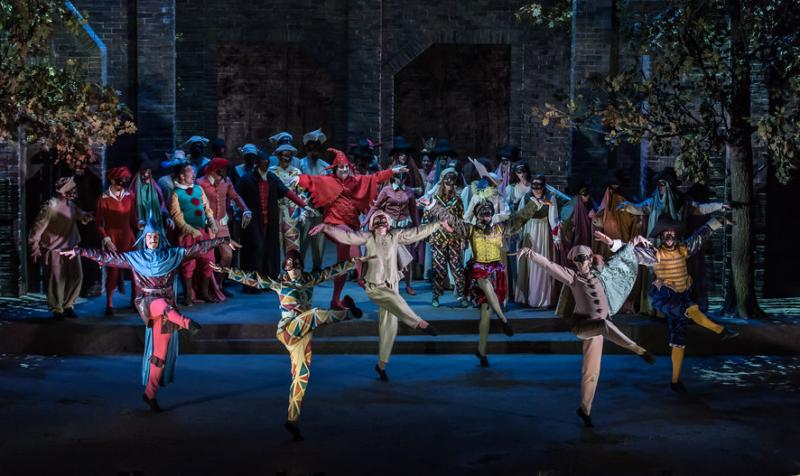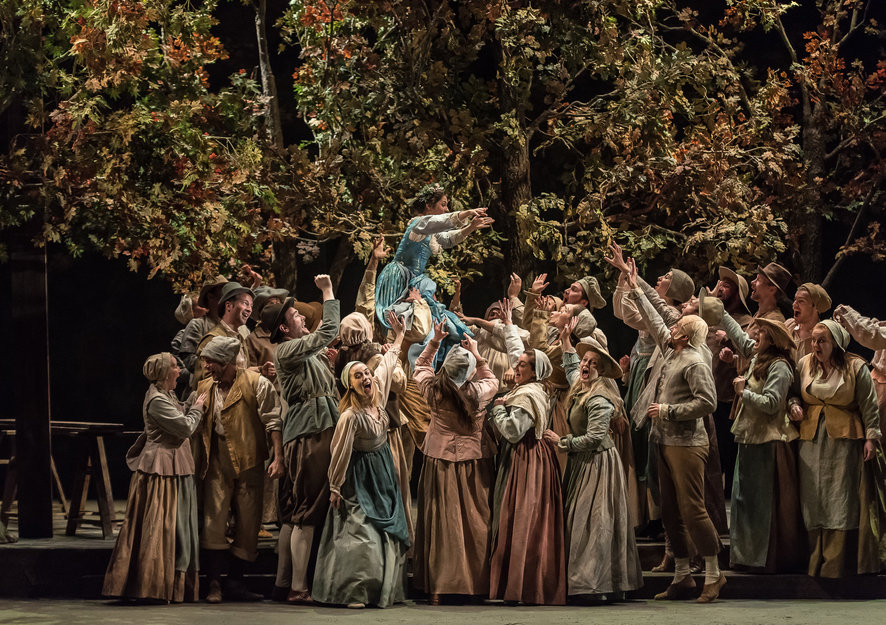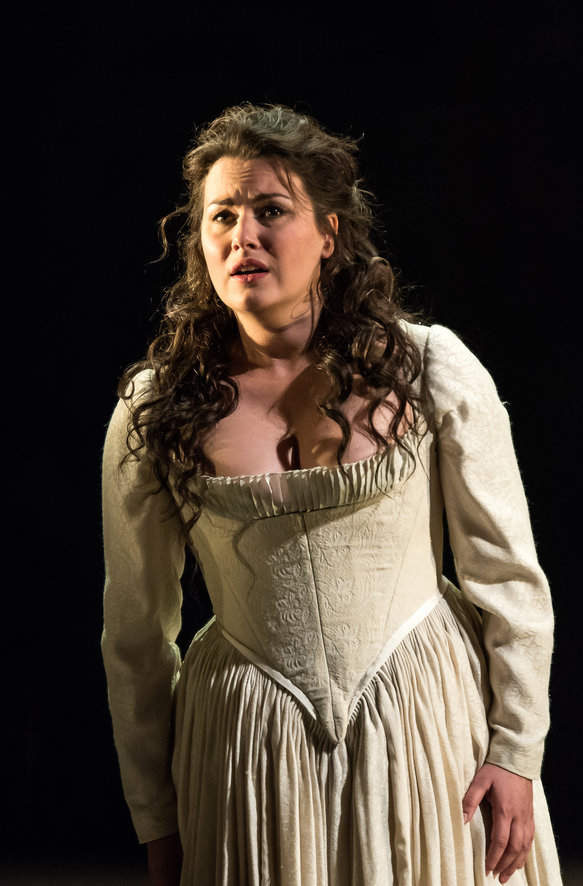Le Pré aux Clercs, Wexford Festival Opera | reviews, news & interviews
Le Pré aux Clercs, Wexford Festival Opera
Le Pré aux Clercs, Wexford Festival Opera
A French operatic delicacy is served just a little too sweet for a contemporary audience

“No courtier or lady’s champion would dream of fighting a duel anywhere else…” The setting for duels, liaisons, champagne and love, Paris’s Pré aux Clercs gives its name to Ferdinand Herold’s almost-comic 1832 opera – a welcome mood-lightener in this season’s otherwise tragic fare at the Wexford Festival.
The context – France’s 16th-century Wars of Religion – offers not only echoes of Meyerbeer’s Les Huguenots but also hints of the strife to come in a love-intrigue where religion as well as romance is at issue. Marguerite de Valois and her lady-in-waiting Isabelle are diplomatic prisoners at the French court, high-ranking bargaining counters in the conflict between the Catholic Henri III (Marguerite’s brother) and the Protestant King of Navarre (Marguerite’s husband). Though courted by the swashbuckling Comte de Comminges, Isabelle is in love with her childhood friend the Baron de Mergy. When the latter in conveniently sent as an envoy to Paris they must contrive to marry before Isabelle is forced into an alliance with Comminges against her will.
 It is impossible to overstate the popularity of Hérold’s work in France, not only in its day but right up until the mid-20th century. By 1950 Le Pré aux Clercs had racked up over 1,600 performances at the Opera-Comique – astonishing for a work that has subsequently dropped into obscurity faster than a defenestrated Frenchman. Revived here in partnership with the Palazzetto Bru Zane, the work reveals a handful of charming arias and some attractive ensembles, but fails to raise the pulse as other Wexford rarities have.
It is impossible to overstate the popularity of Hérold’s work in France, not only in its day but right up until the mid-20th century. By 1950 Le Pré aux Clercs had racked up over 1,600 performances at the Opera-Comique – astonishing for a work that has subsequently dropped into obscurity faster than a defenestrated Frenchman. Revived here in partnership with the Palazzetto Bru Zane, the work reveals a handful of charming arias and some attractive ensembles, but fails to raise the pulse as other Wexford rarities have.
Eric Ruf’s production plays it straight, giving Le Pré the pretty, period treatment. A courtly masquerade comes complete with Harlequins and Columbines, Marguerite sports a succession of impressive velvet farthingales, while a comic sub-plot between country innkeeper Nicette and her fiancé Girot comes embellished with set-piece songs and dances.
It’s all terribly charming, but coupled with Hérold’s sugary score – vividly championed here by conductor Jean-Luc Tingaud and the Wexford Festival Orchestra – I question whether it’s judged correctly for contemporary audiences. Strong performances from a fine, French-speaking cast (there’s a lot of dialogue to get through) help it remain buoyant here, however, and bring essential sincerity to the sillier proceedings.
 Act I offers little opportunity for Marie-Eve Munger’s Isabelle (pictured left) to shine, but Act II opens with an elegant cavatina-cabaletta showstopper, showing off the soprano’s effortless upper register and coloratura agility. An appealing presence, Munger carries the emotional weight of the central love story. Nico Darmanin’s Mergy works very hard, but on this second night his vocal performance was under-projected and lacking in heroic heft. It’s hard to believe in his duelling defeat of Dominique Côté’s gloriously overwrought, tightly-wound Comte de Comminges – all vocal muscularity and hot temper.
Act I offers little opportunity for Marie-Eve Munger’s Isabelle (pictured left) to shine, but Act II opens with an elegant cavatina-cabaletta showstopper, showing off the soprano’s effortless upper register and coloratura agility. An appealing presence, Munger carries the emotional weight of the central love story. Nico Darmanin’s Mergy works very hard, but on this second night his vocal performance was under-projected and lacking in heroic heft. It’s hard to believe in his duelling defeat of Dominique Côté’s gloriously overwrought, tightly-wound Comte de Comminges – all vocal muscularity and hot temper.
The role of Marguerite is more spoken than sung, but mezzo Marie Lenormand makes tremendous impact, warmly imperious as the political fairy-godmother of the piece, and adding personality to Hérold’s many trios and ensembles. Her acid interplay with Eric Huchet’s Cantarelli – the court’s bibulous Italian master of ceremonies – helps temper the opera’s more pastel-coloured pastoral moments.
Strong support from Magali Simard-Galdes’s perky, soubrette Nicette (her wedding song is a highlight) and her tetchy Girot (Tomislav Lavoie) round out the operatic picture – a Watteau or Fragonard, decorative, elegant, but ultimately unmemorable.
- Le Pré aux Clercs at Wexford Festival until 1 November 2015
rating
Explore topics
Share this article
The future of Arts Journalism
You can stop theartsdesk.com closing!
We urgently need financing to survive. Our fundraising drive has thus far raised £49,000 but we need to reach £100,000 or we will be forced to close. Please contribute here: https://gofund.me/c3f6033d
And if you can forward this information to anyone who might assist, we’d be grateful.

Subscribe to theartsdesk.com
Thank you for continuing to read our work on theartsdesk.com. For unlimited access to every article in its entirety, including our archive of more than 15,000 pieces, we're asking for £5 per month or £40 per year. We feel it's a very good deal, and hope you do too.
To take a subscription now simply click here.
And if you're looking for that extra gift for a friend or family member, why not treat them to a theartsdesk.com gift subscription?
more Opera
 Káťa Kabanová, Glyndebourne review - emotional concentration in a salle modulable
Janáček superbly done through or in spite of the symbolism
Káťa Kabanová, Glyndebourne review - emotional concentration in a salle modulable
Janáček superbly done through or in spite of the symbolism
 Buxton International Festival 2025 review - a lavish offering of smaller-scale work
Allison Cook stands out in a fascinating integrated double bill of Bernstein and Poulenc
Buxton International Festival 2025 review - a lavish offering of smaller-scale work
Allison Cook stands out in a fascinating integrated double bill of Bernstein and Poulenc
 Tosca, Clonter Opera review - beauty and integrity in miniature
Happy surprises and a convincing interpretation of Puccini for today
Tosca, Clonter Opera review - beauty and integrity in miniature
Happy surprises and a convincing interpretation of Puccini for today
 Hamlet, Buxton International Festival review - how to re-imagine re-imagined Shakespeare
Music comes first in very 19th century, very Romantic, very French operatic creation
Hamlet, Buxton International Festival review - how to re-imagine re-imagined Shakespeare
Music comes first in very 19th century, very Romantic, very French operatic creation
 Falstaff, Glyndebourne review - knockabout and nostalgia in postwar Windsor
A fat knight to remember, and snappy stagecraft, overcome some tedious waits
Falstaff, Glyndebourne review - knockabout and nostalgia in postwar Windsor
A fat knight to remember, and snappy stagecraft, overcome some tedious waits
 Salome, LSO, Pappano, Barbican review - a partnership in a million
Asmik Grigorian is vocal perfection in league with a great conductor and orchestra
Salome, LSO, Pappano, Barbican review - a partnership in a million
Asmik Grigorian is vocal perfection in league with a great conductor and orchestra
 Semele, Royal Opera review - unholy smoke
Style comes and goes in a justifiably dark treatment of Handelian myth
Semele, Royal Opera review - unholy smoke
Style comes and goes in a justifiably dark treatment of Handelian myth
 Le nozze di Figaro, Glyndebourne review - perceptive humanity in period setting
Mostly glorious cast, sharp ideas, fussy conducting
Le nozze di Figaro, Glyndebourne review - perceptive humanity in period setting
Mostly glorious cast, sharp ideas, fussy conducting
 Fidelio, Garsington Opera review - a battle of sunshine and shadows
Intimacy yields to spectacle as Beethoven's light of freedom triumphs
Fidelio, Garsington Opera review - a battle of sunshine and shadows
Intimacy yields to spectacle as Beethoven's light of freedom triumphs
 Dangerous Matter, RNCM, Manchester review - opera meets science in an 18th century tale
Big doses of history and didaction are injected into 50 minutes of music theatre
Dangerous Matter, RNCM, Manchester review - opera meets science in an 18th century tale
Big doses of history and didaction are injected into 50 minutes of music theatre
 Mazeppa, Grange Park Opera review - a gripping reassessment
Unbalanced drama with a powerful core, uninhibitedly staged
Mazeppa, Grange Park Opera review - a gripping reassessment
Unbalanced drama with a powerful core, uninhibitedly staged
 Saul, Glyndebourne review - playful, visually ravishing descent into darkness
Ten years after it first opened Barrie Kosky's production still packs a hefty punch
Saul, Glyndebourne review - playful, visually ravishing descent into darkness
Ten years after it first opened Barrie Kosky's production still packs a hefty punch

Add comment